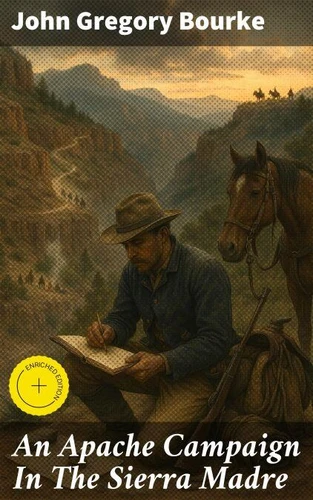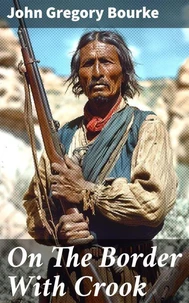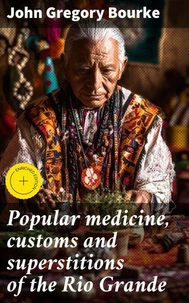An Apache Campaign In The Sierra Madre. Enriched edition. A Warrior's Account of Intense Battles and Cultural Clashes in the American Southwest
Par : ,Formats :
Disponible dans votre compte client Decitre ou Furet du Nord dès validation de votre commande. Le format ePub est :
- Compatible avec une lecture sur My Vivlio (smartphone, tablette, ordinateur)
- Compatible avec une lecture sur liseuses Vivlio
- Pour les liseuses autres que Vivlio, vous devez utiliser le logiciel Adobe Digital Edition. Non compatible avec la lecture sur les liseuses Kindle, Remarkable et Sony
 , qui est-ce ?
, qui est-ce ?Notre partenaire de plateforme de lecture numérique où vous retrouverez l'ensemble de vos ebooks gratuitement
Pour en savoir plus sur nos ebooks, consultez notre aide en ligne ici
- Nombre de pages60
- FormatePub
- ISBN859-65--4777855-4
- EAN8596547778554
- Date de parution15/12/2023
- Protection num.Digital Watermarking
- Taille3 Mo
- Infos supplémentairesepub
- ÉditeurGOOD PRESS
Résumé
In "An Apache Campaign In The Sierra Madre, " John Gregory Bourke meticulously chronicles the military expeditions against Apache tribes in Mexico's Sierra Madre region during the late 19th century. Bourke's narrative combines vivid descriptions of the terrain with a keen analysis of the cultural complexities that defined Apache life. His literary style reflects a blend of historical documentation and personal memoir, offering readers an intimate glimpse into the challenges and ethics of frontier military campaigns.
His writing serves as a pertinent commentary on the broader implications of U. S. military policy towards Indigenous peoples and the landscapes they inhabited. John Gregory Bourke, a soldier and ethnographer, had firsthand experience with the Apache, which informed his perspectives on their culture and conflicts. His extensive travels and interactions with various Indigenous groups provided him a unique lens through which to view the events he documented.
Bourke's background as a soldier and his later passion for ethnology led him to write this critical account, aiming to shed light on the injustices faced by the Apache tribes amidst the backdrop of U. S. expansionism. This book is essential reading for those interested in American history, military strategy, and indigenous studies. Bourke's insights make it a rich resource for scholars and casual readers alike, inviting a deeper understanding of the nuances and tragedies intertwined with the U.
S. government's interactions with the Apache people. In this enriched edition, we have carefully created added value for your reading experience: - A succinct Introduction situates the work's timeless appeal and themes. - The Synopsis outlines the central plot, highlighting key developments without spoiling critical twists. - A detailed Historical Context immerses you in the era's events and influences that shaped the writing. - A thorough Analysis dissects symbols, motifs, and character arcs to unearth underlying meanings. - Reflection questions prompt you to engage personally with the work's messages, connecting them to modern life. - Hand-picked Memorable Quotes shine a spotlight on moments of literary brilliance. - Interactive footnotes clarify unusual references, historical allusions, and archaic phrases for an effortless, more informed read.
His writing serves as a pertinent commentary on the broader implications of U. S. military policy towards Indigenous peoples and the landscapes they inhabited. John Gregory Bourke, a soldier and ethnographer, had firsthand experience with the Apache, which informed his perspectives on their culture and conflicts. His extensive travels and interactions with various Indigenous groups provided him a unique lens through which to view the events he documented.
Bourke's background as a soldier and his later passion for ethnology led him to write this critical account, aiming to shed light on the injustices faced by the Apache tribes amidst the backdrop of U. S. expansionism. This book is essential reading for those interested in American history, military strategy, and indigenous studies. Bourke's insights make it a rich resource for scholars and casual readers alike, inviting a deeper understanding of the nuances and tragedies intertwined with the U.
S. government's interactions with the Apache people. In this enriched edition, we have carefully created added value for your reading experience: - A succinct Introduction situates the work's timeless appeal and themes. - The Synopsis outlines the central plot, highlighting key developments without spoiling critical twists. - A detailed Historical Context immerses you in the era's events and influences that shaped the writing. - A thorough Analysis dissects symbols, motifs, and character arcs to unearth underlying meanings. - Reflection questions prompt you to engage personally with the work's messages, connecting them to modern life. - Hand-picked Memorable Quotes shine a spotlight on moments of literary brilliance. - Interactive footnotes clarify unusual references, historical allusions, and archaic phrases for an effortless, more informed read.
In "An Apache Campaign In The Sierra Madre, " John Gregory Bourke meticulously chronicles the military expeditions against Apache tribes in Mexico's Sierra Madre region during the late 19th century. Bourke's narrative combines vivid descriptions of the terrain with a keen analysis of the cultural complexities that defined Apache life. His literary style reflects a blend of historical documentation and personal memoir, offering readers an intimate glimpse into the challenges and ethics of frontier military campaigns.
His writing serves as a pertinent commentary on the broader implications of U. S. military policy towards Indigenous peoples and the landscapes they inhabited. John Gregory Bourke, a soldier and ethnographer, had firsthand experience with the Apache, which informed his perspectives on their culture and conflicts. His extensive travels and interactions with various Indigenous groups provided him a unique lens through which to view the events he documented.
Bourke's background as a soldier and his later passion for ethnology led him to write this critical account, aiming to shed light on the injustices faced by the Apache tribes amidst the backdrop of U. S. expansionism. This book is essential reading for those interested in American history, military strategy, and indigenous studies. Bourke's insights make it a rich resource for scholars and casual readers alike, inviting a deeper understanding of the nuances and tragedies intertwined with the U.
S. government's interactions with the Apache people. In this enriched edition, we have carefully created added value for your reading experience: - A succinct Introduction situates the work's timeless appeal and themes. - The Synopsis outlines the central plot, highlighting key developments without spoiling critical twists. - A detailed Historical Context immerses you in the era's events and influences that shaped the writing. - A thorough Analysis dissects symbols, motifs, and character arcs to unearth underlying meanings. - Reflection questions prompt you to engage personally with the work's messages, connecting them to modern life. - Hand-picked Memorable Quotes shine a spotlight on moments of literary brilliance. - Interactive footnotes clarify unusual references, historical allusions, and archaic phrases for an effortless, more informed read.
His writing serves as a pertinent commentary on the broader implications of U. S. military policy towards Indigenous peoples and the landscapes they inhabited. John Gregory Bourke, a soldier and ethnographer, had firsthand experience with the Apache, which informed his perspectives on their culture and conflicts. His extensive travels and interactions with various Indigenous groups provided him a unique lens through which to view the events he documented.
Bourke's background as a soldier and his later passion for ethnology led him to write this critical account, aiming to shed light on the injustices faced by the Apache tribes amidst the backdrop of U. S. expansionism. This book is essential reading for those interested in American history, military strategy, and indigenous studies. Bourke's insights make it a rich resource for scholars and casual readers alike, inviting a deeper understanding of the nuances and tragedies intertwined with the U.
S. government's interactions with the Apache people. In this enriched edition, we have carefully created added value for your reading experience: - A succinct Introduction situates the work's timeless appeal and themes. - The Synopsis outlines the central plot, highlighting key developments without spoiling critical twists. - A detailed Historical Context immerses you in the era's events and influences that shaped the writing. - A thorough Analysis dissects symbols, motifs, and character arcs to unearth underlying meanings. - Reflection questions prompt you to engage personally with the work's messages, connecting them to modern life. - Hand-picked Memorable Quotes shine a spotlight on moments of literary brilliance. - Interactive footnotes clarify unusual references, historical allusions, and archaic phrases for an effortless, more informed read.







